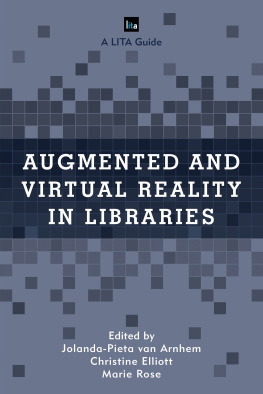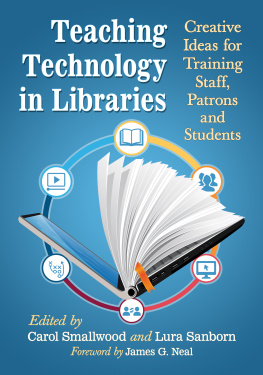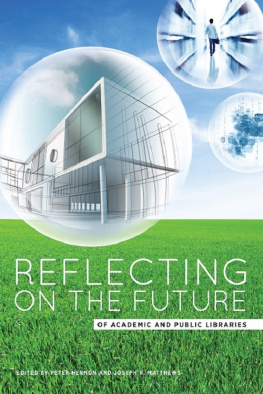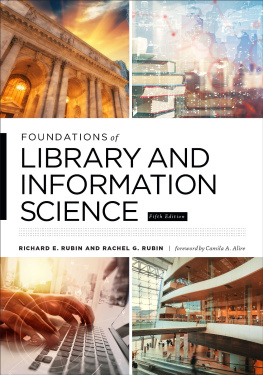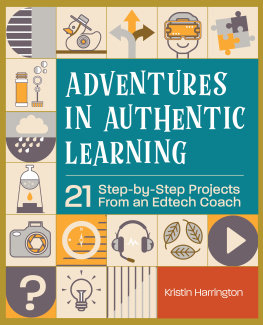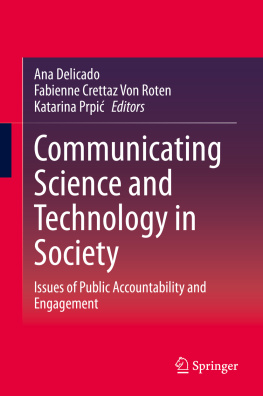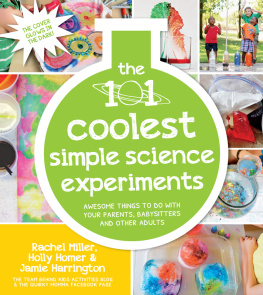Harrington Eileen - Academic Libraries and Public Engagement with Science and Technology
Here you can read online Harrington Eileen - Academic Libraries and Public Engagement with Science and Technology full text of the book (entire story) in english for free. Download pdf and epub, get meaning, cover and reviews about this ebook. year: 2019, publisher: Elsevier Science & Technology, genre: Home and family. Description of the work, (preface) as well as reviews are available. Best literature library LitArk.com created for fans of good reading and offers a wide selection of genres:
Romance novel
Science fiction
Adventure
Detective
Science
History
Home and family
Prose
Art
Politics
Computer
Non-fiction
Religion
Business
Children
Humor
Choose a favorite category and find really read worthwhile books. Enjoy immersion in the world of imagination, feel the emotions of the characters or learn something new for yourself, make an fascinating discovery.

- Book:Academic Libraries and Public Engagement with Science and Technology
- Author:
- Publisher:Elsevier Science & Technology
- Genre:
- Year:2019
- Rating:5 / 5
- Favourites:Add to favourites
- Your mark:
- 100
- 1
- 2
- 3
- 4
- 5
Academic Libraries and Public Engagement with Science and Technology: summary, description and annotation
We offer to read an annotation, description, summary or preface (depends on what the author of the book "Academic Libraries and Public Engagement with Science and Technology" wrote himself). If you haven't found the necessary information about the book — write in the comments, we will try to find it.
Academic Libraries and Public Engagement with Science and Technology — read online for free the complete book (whole text) full work
Below is the text of the book, divided by pages. System saving the place of the last page read, allows you to conveniently read the book "Academic Libraries and Public Engagement with Science and Technology" online for free, without having to search again every time where you left off. Put a bookmark, and you can go to the page where you finished reading at any time.
Font size:
Interval:
Bookmark:
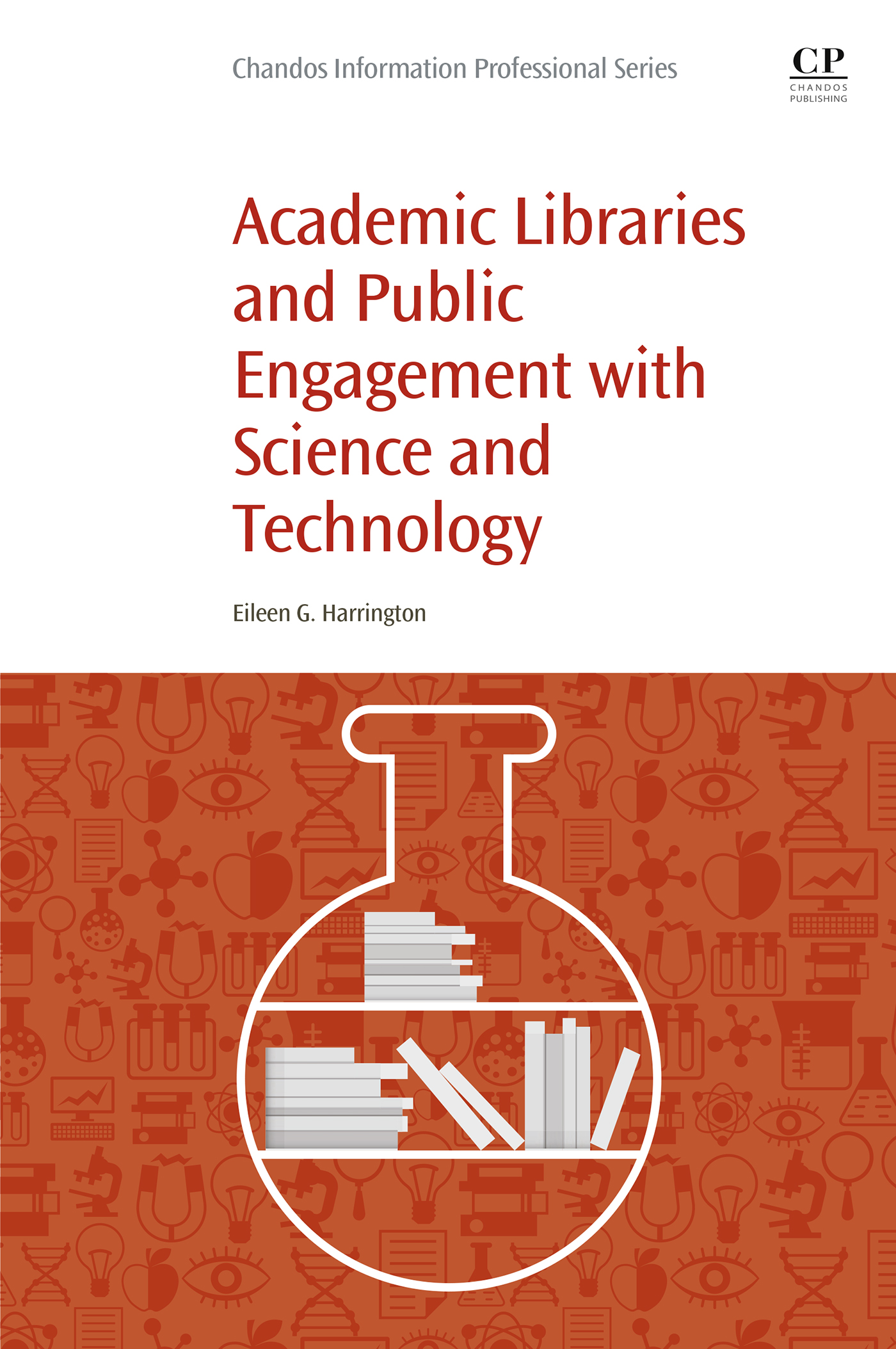
First Edition
Eileen G. Harrington

Chandos Publishing is an imprint of Elsevier
50 Hampshire Street, 5th Floor, Cambridge, MA 02139, United States
The Boulevard, Langford Lane, Kidlington, OX5 1GB, United Kingdom
2019 Elsevier Ltd. All rights reserved.
No part of this publication may be reproduced or transmitted in any form or by any means, electronic or mechanical, including photocopying, recording, or any information storage and retrieval system, without permission in writing from the publisher. Details on how to seek permission, further information about the Publishers permissions policies and our arrangements with organizations such as the Copyright Clearance Center and the Copyright Licensing Agency, can be found at our website: www.elsevier.com/permissions.
This book and the individual contributions contained in it are protected under copyright by the Publisher (other than as may be noted herein).
Notices
Knowledge and best practice in this field are constantly changing. As new research and experience broaden our understanding, changes in research methods, professional practices, or medical treatment may become necessary.
Practitioners and researchers must always rely on their own experience and knowledge in evaluating and using any information, methods, compounds, or experiments described herein. In using such information or methods they should be mindful of their own safety and the safety of others, including parties for whom they have a professional responsibility.
To the fullest extent of the law, neither the Publisher nor the authors, contributors, or editors, assume any liability for any injury and/or damage to persons or property as a matter of products liability, negligence or otherwise, or from any use or operation of any methods, products, instructions, or ideas contained in the material herein.
Library of Congress Cataloging-in-Publication Data
A catalog record for this book is available from the Library of Congress
British Library Cataloguing-in-Publication Data
A catalogue record for this book is available from the British Library
ISBN: 978-0-08-102124-8 (print)
For information on all Chandos publications visit our website at https://www.elsevier.com/books-and-journals

Publisher: Jonathan Simpson
Acquisition Editor: Glyn Jones
Editorial Project Manager: Gabriela D. Capille
Production Project Manager: Debasish Ghosh
Cover Designer: Miles Hitchen
Typeset by SPi Global, India
I extend a heartfelt thanks to all the librarians who participated in this project with me. I sincerely appreciate them taking the time to share their experiences and expertise with me. I am inspired by the amazing work they do, and I hope others will be, too. Many thanks, as well, to Bridget, Moira, Tim, Irene, and Maggie who strongly supported me throughout this endeavor in various ways.
Recent surveys show that many North American adults have limited knowledge of basic scientific facts. With science and technology pervading our lives, a need for basic science literacy is imperative. From climate change to GMOs (genetically modified organisms) to global epidemics such as Ebola and Zika, we need basic scientific knowledge to be able to make informed personal and policy decisions. At the same time, in a country where a questioning of facts has become ever more widespread, many look upon science and scientists with mistrust. Given these realities, this chapter provides an overview of science literacy in the U.S., issues around retention in STEM (science, technology, engineering, and math) fields, pubic engagement with science research, and the roles that academic libraries can play in this arena. It also includes an overview of the subsequent chapters.
Science literacy; Academic libraries; Science communication; STEM retention; Public understanding of science and technology; Community engagement
On a rainy April 22, 2017, between 70,000 and 100,000 people gathered in Washington, DC for the first March for Science ().
Even with this increased sense of hostility towards science, many still have confidence in scientists and scientific institutions and recognize their value in fostering the public good, boosting our economy, and promoting a democratic society. The sheer numbers of people who participated in the March for Science events around the world is concrete evidence of this. A 2014 survey conducted by the ).
Given these realities, this chapter provides an overview of the landscape of science literacy in the U.S., issues around retention in STEM (science, technology, engineering, and math) fields, public engagement with science research, and the roles that academic libraries can play in this arena. The following sections will touch on these areas, followed by an outline of the chapters that make up this book.
Various definitions of science literacy exist and debate still surrounds how best to measure it. Certain themes, however, emerge in many of the definitions. Earlier definitions tended to emphasize knowledge of basic scientific facts, and the way to counter science illiteracy was to expand teaching and testing on those basic facts of school-age children, as well as sharing information with the broader public (, p. 219). To achieve civic science literacy, a person needs to not only have a basic understanding of scientific concepts and processes, but also be able to apply them in decision-making and/or engagement with scientific issues or new technologies. A definition from a report by the Organization for Economic Co-Operation and Development (OECD) combines many of these different strands:
Scientific literacy is the capacity to use scientific knowledge, to identify questions and to draw evidence-based conclusions in order to understand and help make decisions about the natural world and the changes made to it through human activity.
(, p. 133)
In this same report, the authors stress that scientific literacy should be viewed as a continuum rather than defining people as scientifically literate or not.
Given the various definitions of science literacy and an emphasis on civic science literacy in particular, many studies on the public understanding of science over the past few decades have focused not only on the facts of science but also measured an understanding of the scientific process and science in policy debates ( survey found differences by race and ethnicity, which mirrored past studies conducted by the National Science Board. On fact-based questions, Caucasians scored an average of 8.4 correct answers out of 12, versus 7.1 for Hispanics and 5.9 for African Americans. The authors suggest some reasons for these discrepancies could include differences in formal and informal educational opportunities throughout their lives and the underrepresentation of minorities in STEM fields.
The results of studies that measure basic science literacy are often not as clear-cut as they appear on the surface, and they can demonstrate the complex relationships between science, politics, and society. The level of someones scientific literacy does not always correlate with their views on certain scientific issues, scientists, or the scientific process. As adds support to this claim. She examined the differences in basic scientific knowledge among different generational cohorts, including pre-World War II, Baby Boomers, Generation X, and Millennials. She found that many pseudoscience concepts, such as astrology and the belief that UFOs have visited Earth, showed greater appeal to more recent generations than older generations. This disputed her hypothesis that more recent generations have received more science education so would likely be more scientifically literate and reject pseudoscience beliefs. In addition, even though many of the instruments used to measure scientific literacy have moved to a more balanced approach, they still tend to focus heavily on particular facts. In different situations, such as policy decisions versus consumer health choices, people might need different kinds of knowledge, and these measures do not always reflect peoples understanding in these different situations. In many cases, people might be ignorant of certain scientific facts or processes, but that does not mean they are stupid. Many will possess critical thinking skills and other knowledge that they can apply when confronting scientific issues.
Font size:
Interval:
Bookmark:
Similar books «Academic Libraries and Public Engagement with Science and Technology»
Look at similar books to Academic Libraries and Public Engagement with Science and Technology. We have selected literature similar in name and meaning in the hope of providing readers with more options to find new, interesting, not yet read works.
Discussion, reviews of the book Academic Libraries and Public Engagement with Science and Technology and just readers' own opinions. Leave your comments, write what you think about the work, its meaning or the main characters. Specify what exactly you liked and what you didn't like, and why you think so.

